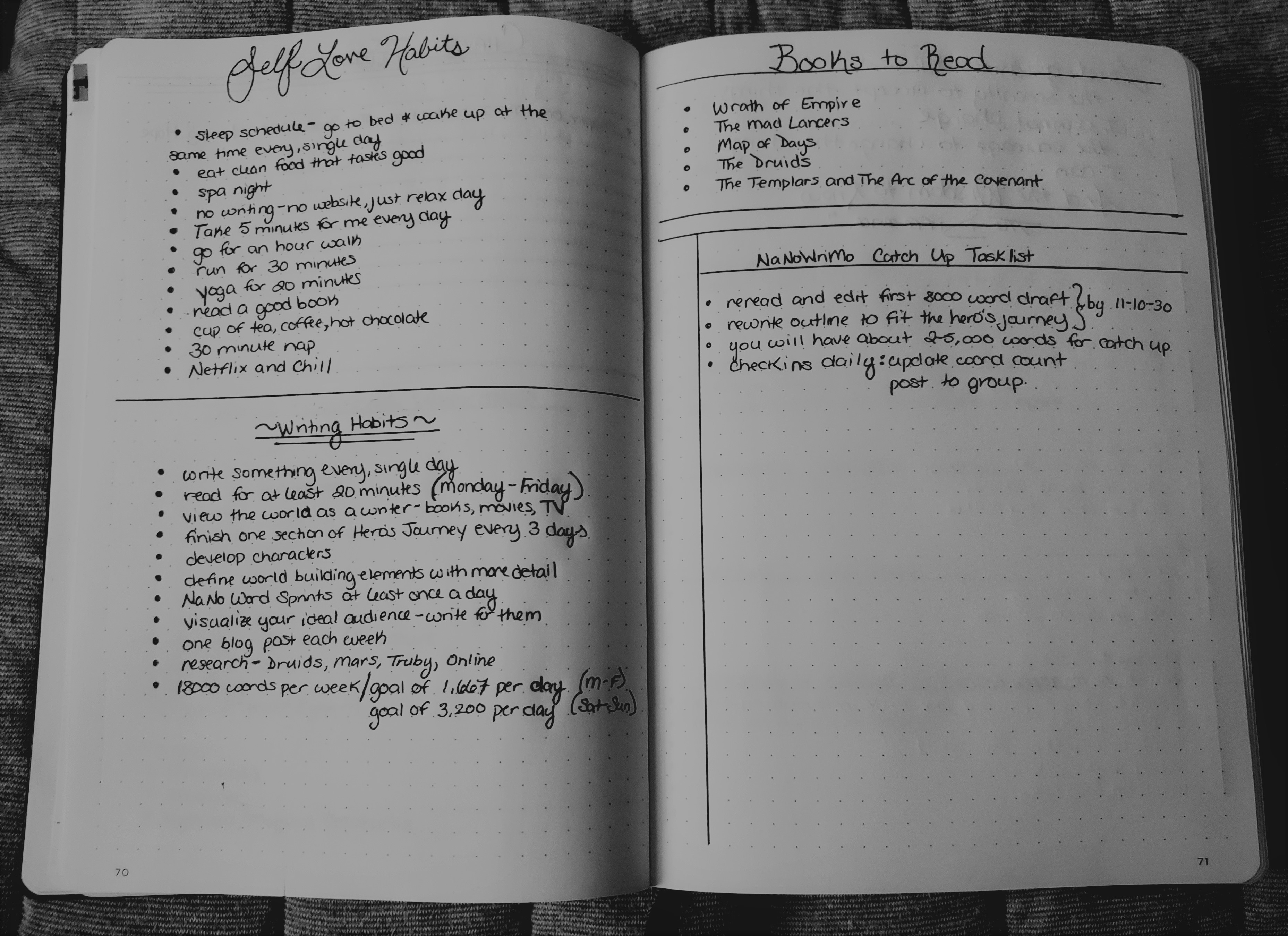How To Make Time to Write

Ok, I know we all have super busy lives. 2020 has brought us unprecedented challenges and obstacles. So how exactly can you make time to write?
The short answer is you can’t. There’s 24 hours in a day. There is no magic trick to add more time for your writing. What you can do, however, is find time.
In this post, I will show you five methods you can use to find more writing time in your busy schedule.
Check out this post to learn how to develop better writing habits.
Five Simple Methods for How to Make Time to Write:
1. Time Blocking

I’m a huge fan of time blocking and I talk about it a lot. That’s because it works. It’s a very simple process, but it opens your eyes to exactly how much extra time you already have in your schedule.
The Steps:
- Choose a calendar. You can use a bullet journal to create one, Outlook Calendar, Google Calendar (my choice), or any other calendar. All you need is something that has hourly time slots. (Check below for a free printable time blocking worksheet!)
- Begin by adding all of your events, appointments, work schedules, sleep (don’t forget about sleeping!). Write down everything that you cannot change. For example, your day job, getting the kids ready for school, chores, etc…
- Next, you are going to analyze your schedule for any free time. Free time will be those empty slots. Highlight them.
- After that, you will analyze your schedule for time that is blocked off, but could be used for multitasking, like brainstorming. This could be during your commute, or as part of your morning routine.
- Finally, decide how much time you want to dedicate to writing every day (or every week). See where you can squeeze in those writing sessions.
- Do you watch Netflix for a few hours before bed? You could dedicate one of those hours, or even thirty minutes, to writing instead.
- Maybe Saturdays are totally free and you can assign a few hours during the day to work on your writing projects. Saturday could be transformed into your “writing day.”
- If you have a long commute where you’re not driving, that’s excellent time to write. There’s lots of software that assists with writing on your phone – Novlr, Google Docs, Microsoft Word, etc…
Free Time Blocking Worksheet
2. Writing is Your Job – Not Just a Hobby

This is often a mistake made by those who have recently discovered writing as their passion. They want to write a book, or create a website, or some other writing project. But they just write when they feel like it. That’s ok. But it will take a lot longer to get things done.
I accomplish my writing goals by dedicating part of my life to my writing. It may sound a bit cultish. But that’s what you have to do if you’re serious about writing.
Writing can be a hobby. But if you want to be a successful writer, you have to take it seriously. That means planning out time to write (see time blocking section above), and actually writing when you say you will.
It’s very easy to get distracted when you sit down to write. So I suggest creating a writer space. Create a place where the only thing you do is write. That way when you sit down to write your brain will be programmed to do just that.
Create a schedule for your writing and stick to it. I work two jobs, and consider writing my third job. I’m also a single mother to one amazing, but often needy, child. If I can do it, so can you.
3. Create Goals: Make Them S.M.A.R.T.

Creating and sticking to goals is not only super useful, it’s highly satisfying. Think about the last time you made a To-Do List and crossed something off of it. Wasn’t that such a great feeling? Apply that concept to your writing and you will do big things.
It’s easy to create a to-do list. It’s also easy to write down some goals. What takes a bit more effort is creating smart goals for your writing.
This process will help you develop goals that are:
Specific –
When you write down a goal, be as specific as you can. Don’t just put “write more.” Instead, decide on something like, “I want to write more often so that I can finish my novel sooner.”
Measurable –
This is key. If your goal cannot be measured, you won’t really know how well you’re doing. A measurable goal allows you to track your progress, which in turn keeps you motivated. Let’s continue with the example from above:
“I want to write more often so that I can finish my novel sooner.”
Make this goal measurable by getting more specific about time and amounts:
“I want to write at least 1,000 words every other day so that I will finish by novel by this date.”
- By adding exactly how many words, you have clarified the “more” part.
- By stating you want to write every other day, “often” has now become measurable.
- Finally, adding a deadline, “this date,” allows you to measure your progress towards finishing by that time.
Achievable –
This is very important. You need to be honest with yourself. Take the example goal we have been using. Is 1,000 words every other day something that you can actually do? If not, change it to something that is more manageable. You know yourself and you know your schedule. You also know things happen to interrupt our plans all the time.
So think about this for a while. Don’t bother dedicating yourself to something that in reality is not possible for you. It’s also important not to worry about what other people are doing. Some people have more time, they have more support. Everyone’s life is different. So don’t compare your goals to anyone else’s. If you must compare, then compare a goal you’re working on to one you’ve actually achieved.
Relevant –
Is this goal important to you? Why?
If you can’t answer those questions, your goal needs to be adjusted. We will continue with our example goal:
“I want to write at least 1,000 words every other day so that I will finish by novel by this date.”
- Why did you start this writing project? What does it mean to you?
- Why do you want to write more often?
- Why do you want to finish by a certain date?
- Is this goal important to other people? If so, why?
- Will it make a difference in your life? Or in someone else’s?
It’s important to find your “why.” Doing so will help keep you motivated on those days when you feel like slacking off. I suggest creating a motivation page in your writer’s notebook. Or simply writing down a list of your why’s and keeping it somewhere you can see it every day.
Time bound –
This goes along with measurability. It’s important to set a deadline for your project. If you don’t, you might never finish it. Deadlines are very motivating. So create one for your writing project. Like your overall goal, it’s important to choose a deadline that is also specific, measurable, attainable, and relevant.
“I want to write at least 1,000 words every other day so that I will finish by novel by this date.”
Let’s analyze “this date.” The amount of time your project will take to write will largely depend on what you’re writing and how much time you can spend working on it.
If you’re participating in NaNoWriMo, then your deadline is set for you. If you want to write a novel, you can do it in a year, or it might take you more or less time. Again, be honest with yourself. Be honest about how much time you can and will commit to this goal. Then set a reasonable deadline.
4. Accountability Partners: Friends Don’t Let Friends Not Write

Accountability partners are absolutely essential. An accountability partner is someone that will hold you to your promises. They will check in on your progress, motivate you on stressful days, sing your praises when you’ve accomplished a major step, etc.. No one can do this alone. Trust me, I’ve tried.
The Steps:
- Find someone you trust. This person should be responsible, available, honest, and compassionate.
- If you don’t have a close family member or friend, reach out to the writing community on Twitter. They will help you.
- Tell your accountability partner(s) about your goals as a writer.
- Lay out your plan for your writing and share those with your partner(s). Send them a physical (or digital) copy of your SMART goal.
- Finally, tell them that you want them to hold you accountable for meeting those goals. Be specific about what you want from them:
- Give them dates and times to check in.
- Let them know your deadlines.
- Make them understand how important this is to you and be sure they will treat your goal just as seriously.
Reach out to your accountability partner when you’re struggling. They will remind you why you want this so badly. They will push you to keep going. Don’t forget to let them know when you’ve reached a major milestone so they can celebrate with you.
5. Reminders Are Your Friend

I have so many reminders on my phone, it’s kind of ridiculous. I also write down absolutely everything in my daily planner. If that’s not enough, I keep a bullet journal to track all my writing projects, goals, progress, and milestones. Sometimes, I even put up sticky notes – just in case.
Let’s be honest, we forget things. Writing things down is great. But what if you forget your planner at home (or at the office)? I do this all the time. My phone is my back up. When those reminders go off, my first instinct is to get annoyed at the interruption. But then I see “time to write,” or what I actually put in there. This motivates me to get back on track and start working on my goal.
Here’s the daily planner I use:

I love it because it’s just the right size. I can bring it anywhere, yet it’s large enough to fit all of my notes, appointments, reminders, etc… It’s the first thing I look at when I wake up, and the last thing I do before bed. Once I have everything written down, I simply transfer the crucial information to my phone’s calendar and add reminders as needed.
This is such a simple and easy way to keep yourself on track, focused, and motivated. I love adding colors and stickers to both my written planner, and my phone reminders. This gives the annoying alert a little flare and makes me a bit happier to get back to writing.
These are five tools you can use to help yourself learn how to make time to write.
Do you have other methods for creating time in your life for your writing projects? Share them with me in the comments section below.
Best of luck on your writing journey!

Note: This page may contain affiliate links for which, if an item is purchased, I will receive a small commission at absolutely no extra cost to you. I only ever post links for products that I have used, found helpful, and loved. Thank you for supporting my writing journey so I can continue to help you on yours!




